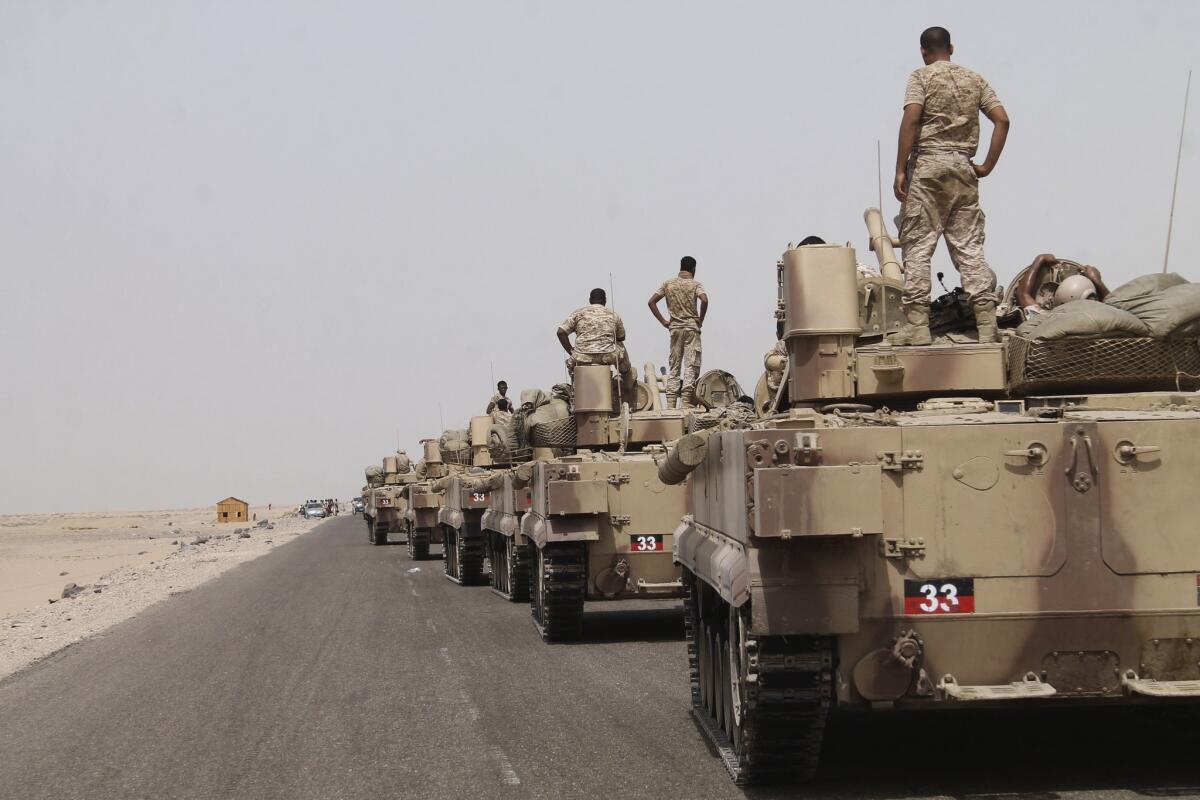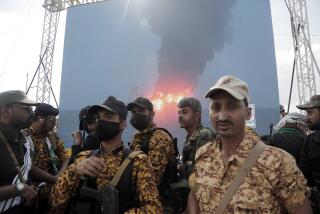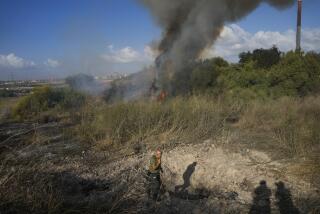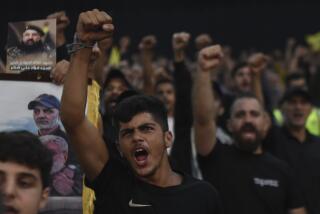Yemen government-in-exile says base once used for U.S. drones retaken

Fighters loyal to Yemen’s exiled government on a road leading to Al Anad military base on Aug. 3.
Clashes persisted around Yemen’s largest air base Tuesday, a day after its declared capture by forces loyal to the country’s exiled President Abdu Rabu Mansour Hadi, military officials said.
The seizure of Al Anad military base, once the hub of a U.S. drone war against Al Qaeda’s potent Yemen branch, would mark a significant gain for the Saudi Arabian-backed troops fighting to reclaim large tracts of territory from Shiite Muslim rebels known as Houthis.
The base in southern Yemen sits at a strategic crossroads on the way to Taizz, the country’s third-largest city and the focus of intense combat between Houthi militias and pro-Hadi forces.
Hadi’s Defense Ministry announced the “liberation” of Al Anad in a statement issued late Monday after several days of fighting in the southern province of Lahj.
The statement thanked the Saudi-led coalition that has waged an air campaign since March against the Houthis and their allies among government forces still loyal to Yemen’s former strongman, Ali Abdullah Saleh.
But a spokesman for the defense authorities in the rebel-held capital, Sana, on Tuesday denied that the base had been taken, claiming rebel forces still occupied most of it.
“The severe clashes taking place since yesterday between the army and mercenaries of Riyadh are still underway,” the spokesman, Sharaf Luqman, said in a statement, speaking of the Saudi capital.
Sources among Hadi’s supporters acknowledged that there were pockets of resistance but insisted their forces were largely in control of the base.
Military units trained and equipped by Sunni Arab-led Persian Gulf nations and local militias siding with Hadi have made a series of advances in recent weeks, driving Houthi forces from the southern port city of Aden and pressing north through Lahj.
Some members of Hadi’s government returned last week to Aden, where Hadi had sought refuge before fleeing to Saudi Arabia in March. Yemen’s vice president and prime minister, Khaled Bahah, visited the city Saturday at the head of a delegation that included several Cabinet ministers.
Saudi Arabia and the United Arab Emirates recently stepped up military assistance to Hadi’s forces, shipping armored vehicles, weapons and ammunition by sea to Aden. Hundreds of troops have also arrived from the two countries, according to local officials and residents.
Saudi Arabia and its allies view the Houthis as proxies for Shiite-led Iran, their main regional rival. The Houthis acknowledge ideological ties but say they do not receive military aid from Tehran.
The fighting, along with an air and sea blockade imposed by the coalition to prevent weapons from reaching the Houthis, has created what aid workers describe as a humanitarian catastrophe.
More than 1,900 civilians have been killed and nearly 100,000 have fled the country since March, according to the latest United Nations estimates.
On Monday, Yemen’s exiled government said it had asked the national airline to divert flights bound for the rebel-held capital to Aden. At the same time, commercial ships will be barred from the Red Sea port of Hodeidah and told to dock in Aden, the government said.
Mazen Ahmed Ghanem, spokesman for the country’s civil aviation authority, protested the decision Tuesday, saying at a news conference in Sana that it would increase the suffering of Yemen’s people.
Paolo Lembo, the U.N. resident coordinator in Yemen, on Tuesday reiterated appeals for the lifting of the blockade, calling it an “indispensable prerequisite” to addressing Yemen’s daunting humanitarian challenges. Aid workers have said they can’t get help to the more than 21 million people in need without the full resumption of commercial imports of food, fuel and medical supplies.
U.N. envoy Ismail Ould Cheikh Ahmed has been pressing all sides to declare an immediate cease-fire and return to the negotiating table.
“The special envoy still feels ... that there is momentum for a political solution to be reached and he is pushing all parties in that direction,” said Ahmad Fawzi, a U.N. spokesman in Geneva.
Special correspondent Al-Alayaa reported from Sana and Times staff writer Zavis from Los Angeles. Special correspondent Amro Hassan contributed to this report.
For more international news, follow @alexzavis on Twitter
More to Read
Sign up for Essential California
The most important California stories and recommendations in your inbox every morning.
You may occasionally receive promotional content from the Los Angeles Times.











